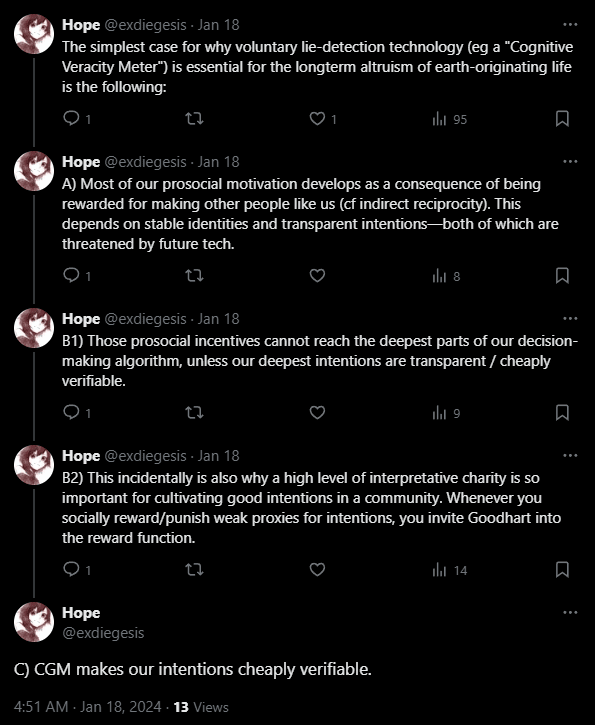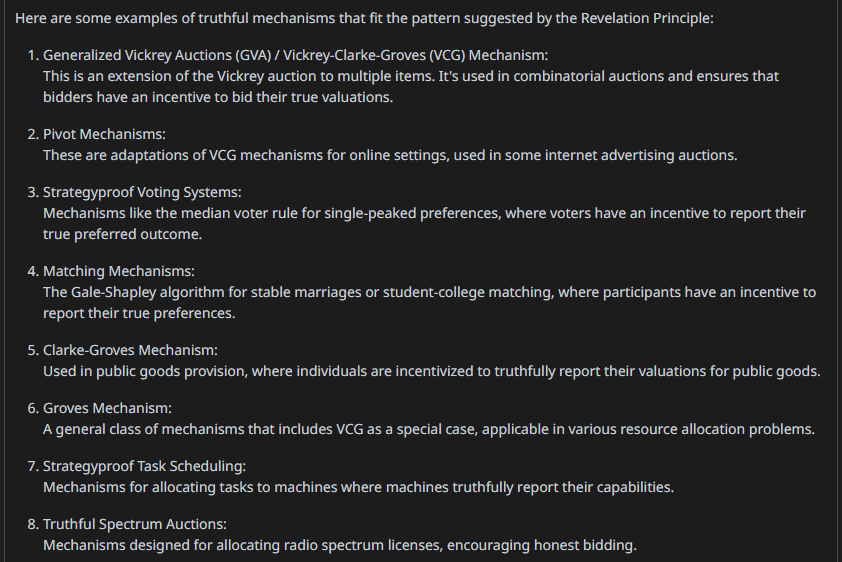Published on July 11, 2024 6:55 PM GMT Hi, niplav! You might be wondering, "what's this about?", and you would be right. You see, I was going to write this to you on Schelling.pt (⛯) in response to our chat about lie-detection and the future of human civilization, but instead I am writing it here. I also considered writing it as an email, and I really liked that idea. But I changed my mind about that too. "Nah", I said. "I'll write it here instead." In the context of trying to make society more honest, I wonder to what extent clever truthfwl mechanisms (re mechanism design) could be important for facilitating the civilizational adoption of / managing the transition to brain-scanning credibility-tech. What I actually should have written in that sentence is: "I have some maybe-interesting maybe-important things which I felt inspired to say to you, but I don't have a smooth-simple way to make them seem coherently relevant, so I'll just say the things." But instead I tried really hard to find a sentence which would justify why I was talking about the things in the first place, especially since I now decided to write it on LessWrong! Tangentially relevant background preposterous claims which I will not be defending here: Anyway, Vickrey auctions feels to me like an almost magical solvent for many societal problems. It's got more practical applications than assurance contracts, and I'm already excited about those. So I asked Sonnet whether there were more patterns like that where it came from: ? Idk what those things are yet, but I smell structure within which I intuit a kernel with which I can generate many such solutions to the problems I care about. If the textbook offers a variety of applications for which there are proofs, the real-life applicability of the kernel likely expands beyond that (once adequately grokked). I suspect I may already be unhappily familiar with problem(s) "Strategyproof Task Scheduling" aims to solve. Deceptive strategy The meta-pattern is: If a game has a Nash equilibrium for deceptive strategies, it is sometimes/often feasible to change the game rules/mechanics such that the deception is an automated baked-in part of the game. This can be be win-win-win if eg the baked-in "deception" is now symmetric so you avoid deadweight losses or smth. At the very least, it means I no longer gain anything from doing epistem/-ic/-ological warfare on you. Like in first-price auctions, I have an incentive to bid just above the second-highest bid, even if I value the item much more than that. And I want to act as if I value the item less than I do, so that you think you can get away with bidding much less than your true value, so that I can get away with bidding just above whatever you think is just above what I'm bidding. First-price sealed-bid auction Thus Vickrey spake: Just short-circuit that whole Death Note drama by declaring that the highest bidder only has to pay the second-highest bid. (The general move here is something like: infer the limit of what deception can provide the players, and declare that as the automatic outcome of the game.) Second-price sealed-bid auction (Vickrey auction) This spell has Nice Properties ? ✨ Interestingly, in Vickrey, the bids have to be sealed in order for it to work. The incomplete information people have about each others' bids is now causing the incentive to reveal true preferences, whereas before it was making people want to hide them. In games/markets where it's the sellers who tend to be poorer (eg in employment), we may instead want mechanisms slightly biased in favor of seller-surplus. The more general heuristic here is just to aim for progressive redistribution of money, so that when people spend their comparative advantages on what's profitable of them, that happens to allocate them where they generate the most utility for others too. Money-inequality breaks the symmetry (dilutes the signal) between [willingness-to-trade] & [surplus utility from trade], so movement in the direction of equality is a step toward making money more incentive-compatible with altruism. And with extreme inequality (viz the current state of the world), voluntary exchange of money can be a minor catastrophe. To see this, consider a limiting-case utopian economy where everybody has ~equal money, and financial incentives drive all of them to allocate their work-hours to where people are happiest to receive them. Now I fly in from space with a bajillion money in their currency, and I just really have a craving for an extravagant pyramid that day. To my surprise, people seem really interested in this green paper stuff I've incidentally got dusting in my luggage. So I strike a deal: they build me a pyramid, and I give them the papers. Seems unambiguously like a win-win, no? ?????️ Only if we ignore opportunity costs. It may indeed be positive-sum for the thousands of workers I employed, but in the world where they didn't spend their time digging dirt, they would have spent that time doing things which were much higher utility for thousands of other people. I'm the only rich person around they can waste their work-hours on, so they couldn't possibly have spent their time any worse if they traded with others. Money will destroy us This is not fine. Say no to boiling like a frog!Postscript
The magic shop smack in the middle of if-you-care: cheap spells against egregores, ungods, akrasia, and you-know-whos!
Trying to make other people believe false things about your preferences.
The highest bidder gets the item for the price of the highest bid.
And nobody knows what the other bids are until the end.
The highest bidder gets the item for the price of the second-highest bid.
And nobody knows what the other bids are until the end.I don't have to worry about "overpaying" relative to the competition, so I can just bid my true value (ie indifference price) for the item.The trade is surplus utility for me, despite having revealed my indifference price. In fact, it gives me the maximum surplus/rent I could have got, assuming the counterfactual is a first-price auction with the same bids.
(Granted, the bids would not stay the same if it were a first-price auction, so this is an unsafe simplification.)
The trade is also surplus utility for the seller, as long as the auction starting price is their indifference price.Though they don't net as much as they could have from a first-price auction (assuming same bids).
This is usually fine and good, however, because most things sold are sold by richer people. And rich people usually have lower marginal utility on money, so mechanisms that favor the buyer (still within bounds of what's positive sum) are usually higher net utility.
(Unfortunately, the rules of the game are usually also set by richer people, so Vickrey-ideal markets are rare in the wild.)
—but it's a slow demise, and the canaries died long ago.…
Discuss




